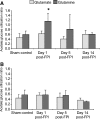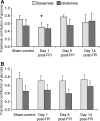Astrocyte oxidative metabolism and metabolite trafficking after fluid percussion brain injury in adult rats
- PMID: 20939699
- PMCID: PMC2996847
- DOI: 10.1089/neu.2010.1508
Astrocyte oxidative metabolism and metabolite trafficking after fluid percussion brain injury in adult rats
Abstract
Despite various lines of evidence pointing to the compartmentation of metabolism within the brain, few studies have reported the effect of a traumatic brain injury (TBI) on neuronal and astrocyte compartments and/or metabolic trafficking between these cells. In this study we used ex vivo ¹³C NMR spectroscopy following an infusion of [1-¹³C] glucose and [1,2-¹³C₂] acetate to study oxidative metabolism in neurons and astrocytes of sham-operated and fluid percussion brain injured (FPI) rats at 1, 5, and 14 days post-surgery. FPI resulted in a decrease in the ¹³C glucose enrichment of glutamate in neurons in the injured hemisphere at day 1. In contrast, enrichment of glutamine in astrocytes from acetate was not significantly decreased at day 1. At day 5 the ¹³C enrichment of glutamate and glutamine from glucose in the injured hemisphere of FPI rats did not differ from sham levels, but glutamine derived from acetate metabolism in astrocytes was significantly increased. The ¹³C glucose enrichment of the C3 position of glutamate (C3) in neurons was significantly decreased ipsilateral to FPI at day 14, whereas the enrichment of glutamine in astrocytes had returned to sham levels at this time point. These findings indicate that the oxidative metabolism of glucose is reduced to a greater extent in neurons compared to astrocytes following a FPI. The increased utilization of acetate to synthesize glutamine, and the acetate enrichment of glutamate via the glutamate-glutamine cycle, suggests an integral protective role for astrocytes in maintaining metabolic function following TBI-induced impairments in glucose metabolism.
Figures




References
-
- Bambrick L. Kristian T. Fiskum G. Astrocyte mitochondrial mechanisms of ischemic brain injury and neuroprotection. Neurochem. Res. 2004;29:601–608. - PubMed
-
- Bartnik B.L. Hovda D.A. Lee P.W. Glucose metabolism after traumatic brain injury: estimation of pyruvate carboxylase and pyruvate dehydrogenase flux by mass isotopomer analysis. J. Neurotrauma. 2007a;24:181–194. - PubMed
-
- Bartnik B.L. Lee S.M. Hovda D.A. Sutton R.L. The fate of glucose during the period of decreased metabolism after fluid percussion injury: a 13C NMR study. J. Neurotrauma. 2007b;24:1079–1092. - PubMed
Publication types
MeSH terms
Substances
Grants and funding
LinkOut - more resources
Full Text Sources
Miscellaneous

